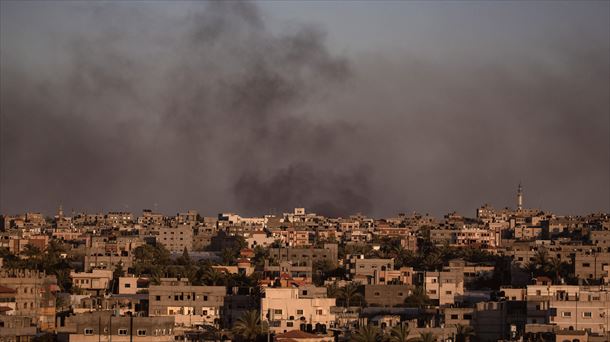When Irina Gene, a 55-year-old English and German teacher, spoke out against the war during a lesson in Penza, Russia, she did not know she had been enrolled by her own students.
“I just wanted to expand my students’s worldview. I was hoping I could break the propaganda that this country feeds. But look where it took me,” said the general, who now faces long prison terms. The “discredit” of the Russian army after his message was spread on social networks.
On March 18, 13- and 14-year-old students in Gene were asked why Russian athletes were banned from international competitions. A decision made by the West, which Gen. sought to contextualize.
“Until Russia starts to become civilized, the admission of Russian athletes to competitions will continue forever … I think this is right,” he said in an audio broadcast for the first time on related Telegram channels. In the Kremlin. “Russia wanted to come to Kyiv and overthrow the government! Ukraine is, in fact, a sovereign state, there is a sovereign government … We live in a totalitarian regime. Any dissent is considered a crime.”
The general also expressed his dissatisfaction with the bombing of a maternity and child hospital in the besieged city of Mariupol by the Russian state media, describing it as a Ukrainian provocation.
Five days after comments to the students about this anti-war, he was called from a local branch of the Russian Federal Security Service (FSB) to come to their offices, where he was informed that security agencies had received the records. Their statements in class.
“I was shocked. I had no idea they were recording,” Jenny recalls. The way to do journalism, – says the general. “But, of course, that was not the argument they were going to make.”
Late last month, Russian prosecutors announced that they had launched a criminal case against Gene under a recently introduced law accusing the so-called Spreading “fake news” about the Russian military.
Prosecutors particularly objected to the general’s comments about the Mariupol Maternal and Child Hospital. He has been banned from leaving the country and his lawyer says he will spend 10 years in prison if convicted.
Russia has launched an unprecedented offensive against the anti-war sentiment. Gen’s is one of four known cases of teachers criticizing war and dismissing or prosecuting students after their students complained to their parents or the authorities.
“I am being persecuted only for unofficial reasons. My family once went through a campaign of persecution in the Soviet Union,” said the general, referring to Stalin’s Great Purge, in which hundreds of thousands of ordinary people denounced their neighbors, friends and relatives as “enemies of the state.”
Although he found it “bored” that it was recorded by students he knew well, he did not bother them. “I do not blame my students; they just follow what their parents think and tell them to do it,” said Gene, who resigned as a teacher.
He believes the parent of one of his students encouraged his son to write it down after the general had made “little” anti-war comments earlier in the lesson. “This situation is terrible. It was very difficult for me, on a personal level. But it is also madness to see how he supports all those around me, those I know, the people I considered my friends, Russia. In this conflict.”
Six weeks after the start of the Russian invasion of Ukraine, opinion polls suggest that the Kremlin, with the help of ruthless state propaganda, has managed to mobilize popular support for its military action.
Moscow has indicated from the outset that it will not tolerate dissenting voices in the education sector. The country’s education minister, Sergei Kravtsov, openly described schools as vital to Russia’s fight against the West to “win an information and psychological war.”
From March 1, schools introduced new lessons in which teachers had to explain to students why they had forced Russia to launch a war against the “fascist regime in Ukraine.” Hundreds of posts have also appeared on Russian social media, where schoolchildren pose for photos in the form of an “Z”, a military emblem that has become a major symbol of support for the Russian-led invasion of Ukraine.
Local kindergartens have even published images of infants crawling on the toy carpet in a Z-shape and preschoolers painting their country’s military symbol in Russian tricolor colors.
Andrei Kolesnikov of the Carnegie Moscow Center says Gene’s experience and that of other professors point to a disturbing “Stalinization” of Russian society. “It is as if we are in a time machine. A climate has been created in which the government promotes denunciation. During the Stalin regime, we went through the same processes that had devastating consequences.”
Kolesnikov said he had been approached by “many university professors” who said they were afraid to mention the “Ukraine issue”. “They say students are trying to provoke them to talk about the conflict, just to condemn them.
Kolesnikov says that if the atmosphere in the country is maintained, Russia “will soon have a new generation of Pavlik Morozov,” referring to the Soviet boy who denounced his father in power and became a propaganda icon whose figure ends up on statues. Russia. Kolesnikov believes that the consequences of the madness of the war extend beyond the classrooms of the country.
There have been several recent reports of passersby claiming that small business owners are posting anti-war messages in their storefronts.
“We are seeing signs of the transformation of an authoritarian regime into a full-fledged totalitarian regime in which members of the mobilized community are actively criticizing each other,” Kolesnikov said.
Translated by Julian Cnochaert.
Source: El Diario
I’m Wayne Wickman, a professional journalist and author for Today Times Live. My specialty is covering global news and current events, offering readers a unique perspective on the world’s most pressing issues. I’m passionate about storytelling and helping people stay informed on the goings-on of our planet.



